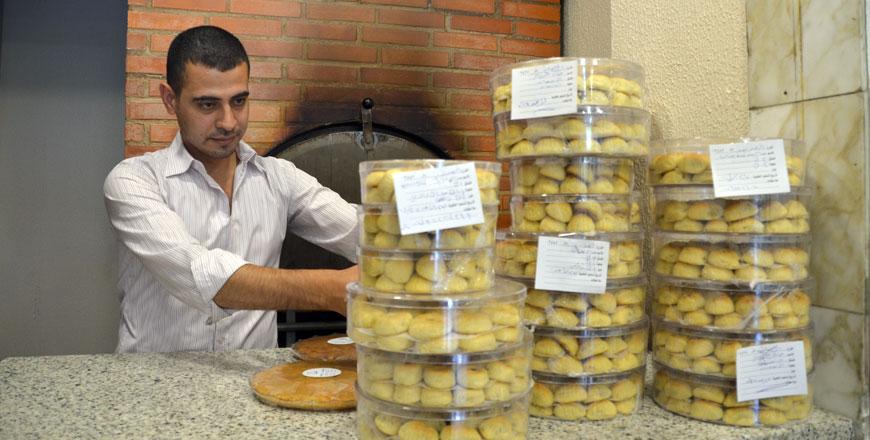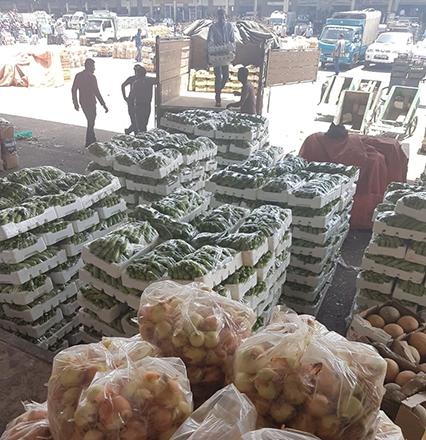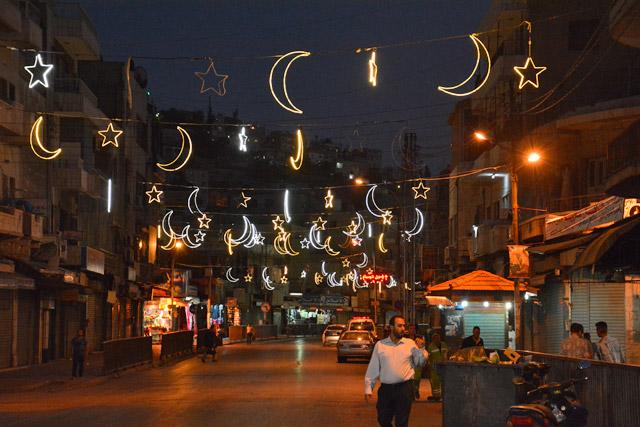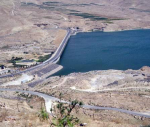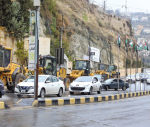You are here
Overconsumption contradicts Ramadan spirit, experts warn
By Suzanna Goussous - Jun 14,2016 - Last updated at Jun 14,2016

Shoppers examine merchandise at a market in downtown Amman recently. Consumption of food and beverages tends to rise in Ramadan (Photo by Amjad Ghsoun)
AMMAN — For many Muslims, Ramadan is a time for family gatherings and generous banquets to break the daily fast, but experts warn that excessive consumption goes against the spirit of the holy month.
For Hania Ayyat, a mother of four, hosting friends and relatives is part of Ramadan, but she is careful not to be wasteful.
“This month comes once a year, so our consumption increases because we have more guests in our house. But I am against the idea of buying food that would go to waste the next day,” she said.
Ayyat told The Jordan Times in a recent interview that she tries to buy sufficient food for guests, without being excessive, but that she gives any leftover food to underprivileged children who work near her house.
Hani Dmour, a marketing professor at the University of Jordan, says it is common for people to serve generous meals for the fast-breaking iftar meal at sunset, or the pre-dawn suhour meal, but he stressed that moderation is key.
“Many of us host banquets in Ramadan for religious purposes and to get spiritually closer to God. It is a month of sharing meals,” said Dmour.
But, he added: “Some people’s consumption during the month cannot be justified, not to mention that over-eating is unhealthy.”
Dmour argued that Jordanians’ consumption during Ramadan is “irrational” and driven by impulse.
“Consumption should be moderate, not boastful. One should buy and consume the same amount as any other month,” he noted.
Food consumption rises by 20 per cent in Jordan during Ramadan, although overall consumption rates have fallen in the Kingdom over the last five years, says Foodstuff Traders Association President Khalil Haj Tawfiq.
“Consumers felt compelled to rationalise their consumption. Sales have decreased and people tend to buy products that have discounts. There is a noticeable decline in purchasing power,” Haj Tawfiq told The Jordan Times recently.
In Ramadan, he said, demand for certain products increases.
Consumers tend to shop in the five days before the fasting month starts, and consumption drops in the first week of Ramadan, he added.
The influx of refugees and the start of the General Secondary Education Certificate Examination summer session contributed to the fall in consumption during Ramadan compared to previous years, according to Haj Tawfiq.
“The overall mood also plays a role in the drop of consumption during Ramadan this year. People are not in high spirits nowadays because of the situation in neighbouring countries,” he argued.
Hassan Abu Arqoub of the Iftaa Department called for avoiding waste during Ramadan.
“Those who cook at home should know the daily consumption of family members, bearing in mind that the stomach’s capacity may limit the consumption of food if the person is fasting,” he told The Jordan Times.
“Extra food in Ramadan should be shared with neighbours or those in need. This is what the month is about. Islam’s real values include doing good deeds and contributing to the community,” he added.
Mohammad Tarawneh, a social anthropologist, said consumption rises in some families because of social concepts and customs.
“There is a gap between religious teachings and the consumption behaviours of people in Ramadan in real life,” he told The Jordan Times.
Some people believe that those who spend more belong to a higher social class, he said, noting that this is against the teachings of Islam.
Tarawneh blamed society’s ignorance about religious values and overconsumption on the absence of a strong work ethic, and people’s reluctance to read books.
“According to studies, an Arab on average reads one quarter of a page each year and works for around 28 minutes of the eight-hour working day. This leads to unconscious overconsumption and disregard for the values of the fasting month,” he said.
Related Articles
AMMAN — Jordanians and guests are expected to spend up to JD4 million on sweets during Eid Al Fitr holiday, including some JD1.7 million on
AMMAN – Contrary to previous years, demand on food commodities has decreased during the first five days of Ramadan, according to stakeholder
AMMAN – With the holy month of Ramadan around the corner, foodstuff traders say the local market is ready to welcome the fasting month.Accor


